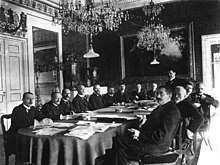Rudolf Wissell
Rudolf Wissell (8 March 1869 – 13 December 1962) was a German politician in the Social Democratic Party of Germany (SPD).In 1908, he joined the Generalkommission der Gewerkschaften (the central workers' secretariat of trade unions) in Berlin, later becoming head of its social policy department.In the German Revolution, Wissell became Zweiter Vorsitzender (deputy chairman) of the Generalkommission where he opposed the formation of a government based on workers' and soldiers' councils and argued for an agreement with employers.[1] One result of his arguments was the conclusion of the Stinnes-Legien Agreement, which meant that the employer's associations for the first time recognised the trade unions as the representatives of the workers.In this function in the cabinets of Philipp Scheidemann and Gustav Bauer, he opposed the left-wing councils and worked towards a socially controlled economy for the benefit of the community.After the Nazis' rise to power in early 1933, Wissell was expelled from public life, being a prominent Social Democrat.


Berlin-TempelhofScheidemann cabinetRobert SchmidtEugen SchifferPhilipp ScheidemannOtto LandsbergGustav BauerUlrich von Brockdorff-RantzauEduard DavidHugo PreußJohannes GiesbertsJohannes BellGeorg GotheinGustav NoskeSocial Democratic Party of GermanyWeimar RepublicGöttingenPrussianProvince of HanoverBremenDeutscher Metallarbeiter-VerbandGrenadierLübeckGeneralkommission der GewerkschaftenBerlinVorwärtsReichstagGerman Revolutiongovernment based on workers' and soldiers' councilsAllgemeiner Deutscher GewerkschaftsbundStinnes-Legien AgreementIndependent Social Democratic Party of GermanyCouncil of the People's DeputiesNational AssemblyCabinet of PersonalitiesHermann MüllerGreat DepressionUniversity of KielEnabling ActCommunist Party of GermanyGroßes Bundesverdienstkreuzgrave of honourBerlin SenateHoly Cross Cemetery, Berlin-MariendorfStaakenGesundbrunnen20th Century Press ArchivesEconomy Ministers of GermanyRudolf SchwanderErnst ScholzJohann BeckerHans von RaumerJoseph KoethEduard HammRudolf KrohneJulius CurtiusPaul MoldenhauerHermann DietrichHermann WarmboldNazi GermanyAlfred HugenbergKurt SchmittHjalmar SchachtHermann GöringWalther FunkFederal Republic of GermanyLudwig ErhardKurt SchmückerKarl SchillerHelmut SchmidtHans FriderichsOtto Graf LambsdorffManfred LahnsteinMartin BangemannHelmut HaussmannJürgen MöllemannGünter RexrodtWerner MüllerWolfgang ClementMichael GlosKarl-Theodor zu GuttenbergRainer BrüderlePhilipp RöslerSigmar GabrielBrigitte ZypriesPeter AltmaierRobert HabeckEast GermanyChrista LuftGerhard PohlFriedrich EbertHugo HaaseWilhelm DittmannEmil BarthBernhard DernburgUlrich Graf von Brockdorff-RantzauZentrumMatthias ErzbergerWalther ReinhardtAdolf von TrothaBauer cabinetErich Koch-WeserAlexander SchlickeOtto Gessler